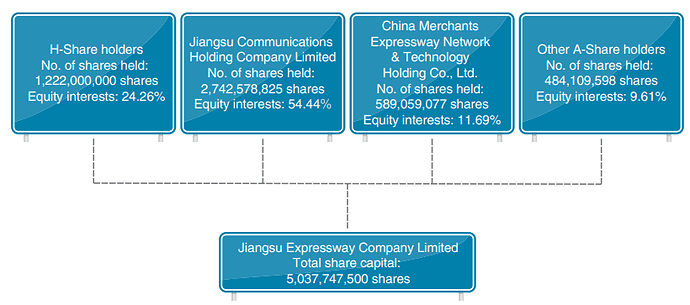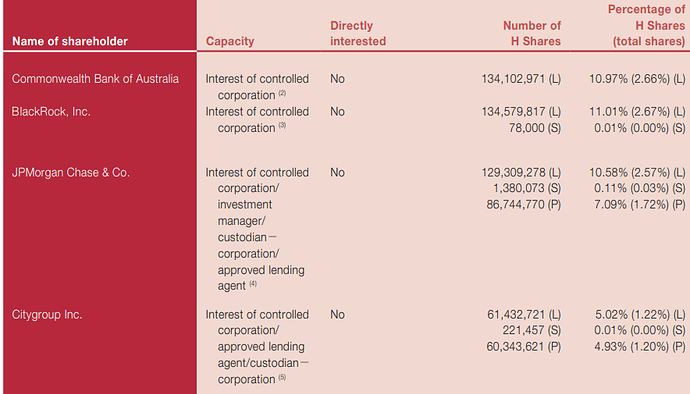Hola,
Lo primero que me preocupa es la estructura accionarial de estas empresas, por el tema de los VIEs que se ha comentado anteriormente. No sé cómo de legal son, qué posibilidades hay de que declaren ilegales esas estructuras, etc etc pero el caso es que no es una estructura jurídica que me de confianza. Sin embargo, he podido ver que no todas las empresas chinas que cotizan en HK o USA están estructuradas a través de VIEs.
Me he mirado el informe anual de Jiangsu Expressway buscando la estructura accionarial y los derechos de voto, por buscar un ejemplo de empresa en la que es posible invertir. Tiene dos tipos de acciones: A (para inversores chinos) y H (para inversores extranjeros y, creo que desde 2007, también para chinos).
Las acciones tipo A representan el 75,74% del accionariado, y las tipo H el 24,26% restante.
Jiangsu Communications pertenece al gobierno chino, que por tanto tiene el 54,44%. China Merchants he podido ver que es una cotizada, y tiene el 11,69%. En teoría no influyen en el negocio, solamente están en el accionariado (aunque esto no se lo cree nadie, obviamente depende de las decisiones del partido chino):
Estos porcentajes son sobre las acciones totales, lo que quiere decir que solo hay un 10% de acciones tipo A de “free float”.
Si vamos por la parte de las acciones tipo H, tenemos a viejos conocidos:
Así que en principio en cuanto a accionariado pues bueno, la presencia del gobierno chino no me agrada pero entiendo que en China va a ser así, pero que BlackRock, CityGroup y el Banco de Australia tengan acciones tipo H me da más confianza.
Ahora bien: qué hay de los derechos de voto? pues leyendo y buscando en el informe anual no he encontrado nada respecto a las acciones tipo H, el típico “todas las acciones con los mismos derechos de voto”. Lo único que he podido ver es que para Jiangsu Communications, la del estado, le asignan un % de derechos de voto exactamente igual al número de acciones, así que deduzco que cada acción tipo A y tipo H da un derecho de voto idéntico. Esto lo deduzco, no viene escrito expresamente.
Por ahora ni rastro de los VIE, de hecho en el informe anual no pone nada. Como sigo con la mosca detrás de la oreja busco más sobre los VIE, y me encuentro lo siguiente:
“Since SINA unveiled the VIE structure to public investors during its IPO offering on NASDAQ in 2000, this complex corporate structure has become very popular among Chinese companies who want access to foreign investment. Data shows that more than half of the Chinese companies listed on the NYSE or NASDAQ are using the VIE structure.” (sacado de https://rroyselaw.com/international-law/ecommerce/the-china-vie-structure-is-vulnerable-so-why-is-it-still-used/ )
Es decir, más de la mitad de las compañías que cotizan en USA usan VIEs… pero y las demás que usan? ni idea. Bueno, además pone que se usan desde el 2000, pero… cuándo se lanzaron las acciones tipo H de Jiangsu Expressway?
En 1997… vaya, pues entonces no puede ser un VIE de esos, no? Será otra cosa… que desconozco, o simplemente otro tipo de acciones. No lo se.
Por último, esta compañía cotiza en China y en HK, así que me he ido a ver si hay diferencias de valoración:
Hong Kong: 10,38 HKD
China: 10,05 CNY
Tipo de cambio: 1 CNY=1,11 HKD, por tanto debería cotizar a 11,19 HKD. Esto muestra que las acciones tipo H cotizan con un descuento del 8% aproximadamente, y entre los motivos puede estar la liquidez del mercado (el chino es menos líquido, recordemos solo 10% de free float las tipo A), o como yo creo el simple hecho de que son las de inversores extranjeros y hay más miedo.
En conclusión, Jiangsu Expressway creo que no tiene la estructura de los VIE y no me parece que haya un gran riesgo político detrás, y por lo que sé hasta ahora si podría meter una pequeña parte de mi patrimonio en ella si las cuentas me cuadran. Por ahora es todo lo que puedo decir
Un saludo



